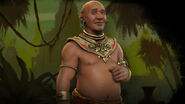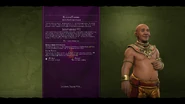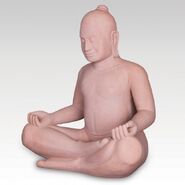(→Trivia) Tag: Visual edit |
(→Trivia: Rewrote a bullet point.) Tag: Visual edit |
||
| Line 63: | Line 63: | ||
* Jayavarman VII's leader ability references [[wikipedia:Buddhism in Cambodia#Jayavarman VII|his patronage of Buddhism as the Khmer state religion]], while his leader agenda references [[wikipedia:Nirvana (Buddhism)|the Buddhist state of freedom from the cycle of rebirth]]. |
* Jayavarman VII's leader ability references [[wikipedia:Buddhism in Cambodia#Jayavarman VII|his patronage of Buddhism as the Khmer state religion]], while his leader agenda references [[wikipedia:Nirvana (Buddhism)|the Buddhist state of freedom from the cycle of rebirth]]. |
||
* Jayavarman VII refers to you as "Preah Ang" which can be translated as "God-King". This for the Khmer was a title that only the Khmer kings would be referred to as. Even in his war declaration and defeat, he still calls you "Preah Ang" meaning he still thinks of you as an equal. |
* Jayavarman VII refers to you as "Preah Ang" which can be translated as "God-King". This for the Khmer was a title that only the Khmer kings would be referred to as. Even in his war declaration and defeat, he still calls you "Preah Ang" meaning he still thinks of you as an equal. |
||
| − | * Jayavarman VII's |
+ | * The bracelet on Jayavarman VII's right wrist bears the [[Firaxis Games|Firaxis]] logo. |
==Gallery== |
==Gallery== |
||
Revision as of 15:07, 28 May 2020
- "Provide for your people. To do less is to be less."
Jayavarman VII (c. 1123 – c. 1218) was a king of the Khmer Empire in present-day Siem Reap, Cambodia, reigning from approximately 1181 to 1218. He leads the Khmers in Civilization VI.
Jayavarman's Khmer Empire features populous cities of devout Buddhists, especially those along rivers where all their abilities can come into play.
Intro
Wise Jayavarman, seventh to hold the name, the Khmer admire your dedication to their well-being. Your command of the land's fresh waters lets you feed your hungry people, just as it brings you ever closer to Heaven. Go forth, divine architect! Build an empire that approaches perfection—and may your enemies find their end beneath your mighty war elephants.
In-Game
Jayavarman VII's unique agenda is called An End to Suffering. He likes civilizations that have Holy Sites and a high average city ![]() Population, and dislikes civs that are lacking in either of these areas.
Population, and dislikes civs that are lacking in either of these areas.
His leader ability is called Monasteries of the King. His Holy Sites trigger Culture Bombs, and provide extra ![]() Food and
Food and ![]() Housing Housing if placed along rivers.
Housing Housing if placed along rivers.
Detailed Approach
Jayavarman wants to take advantage of his river start bias and place his Holy Sites along rivers where they will claim nearby land and provide ![]() Food and
Food and ![]() Housing Housing. These cities will then bloom when the Khmer reach the late Classical era when both Aqueducts and their unique Prasat temples come online. If neighbors crowd them in, they can use their Domrey unique unit to besiege a few nearby cities, probably grabbing additional sites along rivers. With a populous empire based around the Buddhist faith, Jayavarman can pursue any victory type moving forward into the later game.
Housing Housing. These cities will then bloom when the Khmer reach the late Classical era when both Aqueducts and their unique Prasat temples come online. If neighbors crowd them in, they can use their Domrey unique unit to besiege a few nearby cities, probably grabbing additional sites along rivers. With a populous empire based around the Buddhist faith, Jayavarman can pursue any victory type moving forward into the later game.
Lines
Jayavarman VII is voiced by Heng Sarorn. He speaks royal Khmer.
Voiced
Agenda-based Approval: Ending spiritual suffering is just as important as easing physical distress. You understand this. (ដោយសារកាបញ្ចប់ទុកវេតនាផ្លូវចិត្ត គឺចាំបាច់ខ្លាំងណាស់ ដូចគ្នានឹងការសំរួលផ្លូវចិត្តផងដែរ។ / Daoysaar ka banhchob touk vetenea phleuchett ki chabach khlang nahh dōchkneanung kar saamm ruol phleuchett paang dair.)
Agenda-based Disapproval: How can your people attain the divine without examples of divinity? (តើប្រជានរាស្រ្គរបស់ព្រះអង្អចូលទៅជិតព្រះអង្គយ៉ាងដូចម្តេច? បើគ្នានការនែនាំពីសេចក្តីល្អទេនោះ។ / Tae brachea noreah robahh preah ang choul teuw chit preahang yeang dōchmdech? Baei kmien kar nei nuam pi sechktei lak ah te noh?)
Attacked: War, then? Fools think fortune is on their side. Who will you blame when yours runs out? (សង្គ្រាម? ចុះបន្តាប់គីជាអ្វី? មនុស្សល្ងងតែងតែគិតថាជោកវាស្នានិងនៅជាមួយពួកគេ តើអ្នកណានិងស្តីបន្ទោសនៅពេលព្រះអង្អគិតដូចច្នេះ? / Sangkream? (Laughs) Choh bantuab ki chea avei? Mnouhh longoong tengte ketthea chok veasnah neng neuw cheamuoy puokke. Tae neaknar neng stei bantohh neuwpel preah ang ket dauch chneh?)
Declares War: Your actions reveal your desire for war. The Khmer shall oblige you. (អំពើរបស់ព្រះអង្គបង្ហាញពីចេតនាបង្កសង្គ្រាមហើយប្រជានរាស្រ្គខ្មែរត្រូវតែផ្តល់ការបព្វកិច្ចអោយព្រះអង្គ។ / Ampeu robahh preah ang banghanh pi chetnea bangkah sangkream haey brachea noreahh khmer trauvte phdal kar bapp aoy preah ang.)
Defeated: One gains humility in defeat. I pray you are granted the most humility of all. (បុគ្គលមានចិត្ត សន្តោសគង់បរាជ័យ យើងបូងសួងអោយព្រះអង្គ បានទទួលសេចក្តីសន្តោសសំរាប់មនុស្សគ្រប់គ្នា។ / Bokkol meanchett santohh kong barachei yeung boung suong aoy preah ang bahn totuol sechktei santohh saamrabb mnouhh grobknea.)
Greeting: I am Jayavarman VII, and the Khmer allow me to lead them. Their suffering is my suffering. (ព្រះនាមជ័យវវ្ន័នទី៧ហើយដែរប្រជានរាស្រ្តខ្មែរយាងយើងអោយដឹកនាំពួកគេ សេចក្តីទុកសោករបស់ពួកគេ គឺជាសេចក្តីទុកសោករបស់ទូលបង្គំ។ / Preahneam Jayavarman ti brambi haey der brachie nrea khmer yeang yeung aoy doekneak puokke. Sechktei touk saok robahh puokke kuchea sechktei touk saok robahh toulbangkoum.)
Unvoiced
Accepts a Trade Deal: Yes. It is good for the Khmer.
Delegation: Our delegation brings a-ping, a fried dish. Best to eat the legs before you consume the rest of the tarantula.
Accepts Player's Declaration of Friendship: Perhaps... yes.
Denounced by Player: You defy Heaven with your harsh words. It must be a familiar feeling!
Denounces Player: You must know how to live a divine life—how else could you teach your people to do the opposite?
Invitation to Capital: Very well.
Invitation to City: You should travel to our capital. Behold our prasat to understand what the Khmer hold dear.
Civilopedia entry
He oversaw a truly staggering amount of infrastructure building and rival kingdom-smashing during what many consider the golden age of the Khmer. Meet the people's king, Jayavarman VII.
Born in 1123 CE and the son of King Dharanindravarman II, much of that we know about King Jayavarman VII comes from inscriptions on the temple at Rajavihara (now Ta Prohm) as well as at Phimeanakas. These inscriptions offer a rich, yet still incomplete history of this beloved king.
However, what we do know is that when King Jayavarman VII's reign began during a period of crisis for the Khmer. To the north, their control over distant vassal kingdoms was eroding away, while the Mongols (and later the Ming Dynasty) were expanding their trade interests throughout Southeast Asia (trade of raw materials being how the Khmer remained fabulously wealthy). To the South, revolution was brewing in Malyang. And looking east, the Empire was entering year 14 of their war with the Champa (occupants of what is now central Vietnam).
Jayavarman VII would spend his 20s and 30s at war, supporting King Yasovarman II (a relative of unknown origin) in war against the Cham. An interesting side note: according to legend, King Yasovarman II was attacked by the frankly horrifying divine being Rahu (a floating head which ate suns during eclipses), only to be saved by one of Jayavarman VII's sons.
By 1178, the Cham, under King Jaya Indravarman IV, would invade the Khmer Empire twice, destroying the capital at Yaśodharapura on the second attempt and sacking the temple city of Angkor Wat.
Now it's unclear why, but around this time, Jayavarman VII was said to be living in Vijaya, which is in central Champa (given the history of the period, he may have just been a guest). He would march west and regain control of Khmer—with Cham forces in tow.
This is according to Champa inscriptions, by the way, which are not wholly clear on why these Cham forces would ally themselves with a foreigner. Or why, ten years after he took the throne, a Cham prince would help King Jayavarman seize the Champa capital of Vijaya and assist in the capture of King Indravarman?
By 1181, with a little diplomacy (and some help from his Cham allies), Jayavarman VII had repelled the Cham invaders. Once hostilities died down, he crowned himself king. He would, of course, celebrate the start of his reign by establishing a new capital at Angkor Thom.
At this point, you would expect your newly minted monarch to begin his period of land-grabbing and expansion. And while King Jayavarman would keep up the conflict with Champa, going as far as to install a puppet king in 1190, his reign was notable for turning inward, beginning an unprecedented period of construction and infrastructure building.
King Jayavarman VII saw himself as a warrior for his subjects, and not just one who rode into battle to fight foreign foes (although he did a bit of that, too). In a break with previous Hindu-Khmer kings, which centered the throne in state affairs, King Jayavarman adopted a Buddhist mode of thinking, one which centered the population in the state.
Mahayana Buddhism is believed to meld both compassion (personified by the Bodhisattva Lokesvara) and wisdom (Prajnaparamita), and it was King Jayavarman's aim to create a place of safety and paradise for his subjects.
He would actually make Mahayana Buddhism the state religion, breaking with 400 years of Khmer Hinduism. And to mark the occasion, he would initiate the construction of numerous temples, 102 hospitals, stone-paved highways out of reach of flood waters, the 54 towers at Bayon, and extensive irrigation projects. Another documented project was the construction of rest houses every 15 km throughout the kingdom.
Additionally, the nearly 40 years of his rule would also be marked for its tolerance; while endorsing Buddhism, King Jayavarman VII kept a role for Brahman priests within the palace, a role that continues today in Cambodian kingship.
We don't have many details about the final years of King Jayavarman VII's life, or even the year in which he died (but it was somewhere between 1215 and 1220). However, after his death, he would be given the name Mahaparamasaugata as a tribute to his greatness. As for the Khmer Empire? It would fall into what looks like a precipitous decline. By 1222, the Cham were able to retake the land Jayavarman VII had conquered during his reign.
Still, it's hard to undo all of that temple-building and goodwill-spreading. King Jayavarman VII and his people-driven reign remains fondly remembered in Cambodia, where he figured prominently in state-produced education materials well into the 20th century.
Trivia
- Jayavarman VII's diplomacy screen shows a wat (possibly Angkor Wat) in the middle of a jungle.
- Jayavarman VII's leader ability references his patronage of Buddhism as the Khmer state religion, while his leader agenda references the Buddhist state of freedom from the cycle of rebirth.
- Jayavarman VII refers to you as "Preah Ang" which can be translated as "God-King". This for the Khmer was a title that only the Khmer kings would be referred to as. Even in his war declaration and defeat, he still calls you "Preah Ang" meaning he still thinks of you as an equal.
- The bracelet on Jayavarman VII's right wrist bears the Firaxis logo.
Gallery
Videos
Related achievements

|
Cardamom and Mangos and Elephants
Win a regular game as Jayavarman VII
|

|
Wat is Love
Build Angkor Wat and a Wat in Angkor Wat.
|





